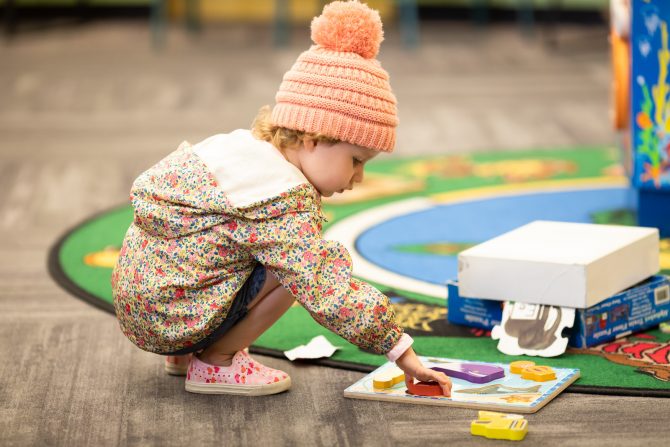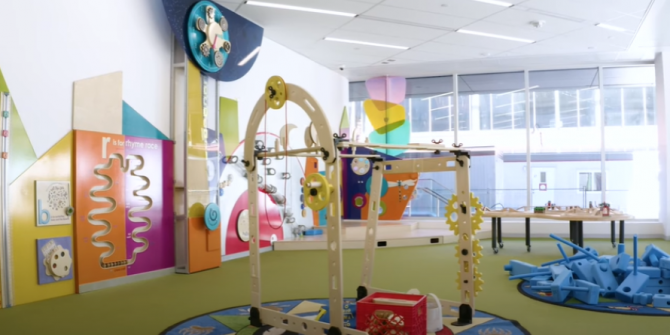Originally published in Nov. 2017 and updated in Aug. 2021. Lori Blahey is a former Senior Marketing Consultant at EPL.

They say play is the work of children—and it’s true! Play is how children learn about the world, themselves and each other. It's as much a part of healthy development as eating vegetables, reading books together and getting a good night’s sleep. Even the United Nations lists play as one of the basic rights of every child.
There is no right or wrong way to play. It's anything from sticking a hand in mashed potatoes to playing with video games or staring out a window. It looks different depending on the day and the child:
- Sometimes children play with friends and other times, on their own.
- Sometimes they may speak aloud and other times, be silent in their heads.
- Sometimes play is messy or risky and other times, quiet and relaxed.
Kids don’t need fancy toys or certificates to play. They need time, space and freedom to explore the ideas that interest them. No matter what it looks like, when children play, they learn.
Why is Play Important for Children?
There are six reasons play, both unstructured and structured, is important for child development:
1. Play Builds Imagination and Creativity
During play, kids stretch their imaginations. They create make-believe games or get lost in pretend worlds. Children act out different solutions while boosting their confidence. They make their own rules and learn how to follow or adapt those rules as needed. These are helpful skills for navigating life and developing relationships with others.
Symbolic play is the ability to imagine one object as another. For example, a stick, a bucket and pinecones can become a cooking spoon, a pot and yummy ingredients. Symbolic play is an important part of healthy development. It builds skills that children need for future learning and problem solving. 1 It also improves creativity, which contributes to success throughout a person’s life. 2
2. Play Fosters Cognitive Growth
What does fostering cognitive growth mean? It means that play is essential to healthy brain development.
Unstructured play is the time when kids direct their own play. They are not bound by schedules or activities directed by adults. Unstructured play helps a child’s brain develop in positive ways. It strengthens and increases neural connections in the brain. These are the paths in the brain that we use for thinking.
Unstructured play also helps build and strengthen the prefrontal cortex of the brain. This area influences the way a child learns, solves problems and gains knowledge about their environment. 3
3. Play Delivers Emotional and Behavioural Benefits
When adults feel overwhelmed, we retreat into activities that soothe us. We go to the gym, sing karaoke with friends, walk around the neighbourhood, weed the garden or play a board game. These activities are more than a distraction. They are a way of bringing play back into our lives and connecting us to the things in life that help ground us.
Children are the same, although they need a lot more playtime. Frequent, daily play can help reduce anxiety, stress and irritability. It also helps boost joy and self-esteem.
Adults observing children at play can help them better understand emotions by naming them. For example, “It sounds like you are nervous about going to school tomorrow”. 4 Listening and asking questions shows kids that adults care. It communicates that their feelings and experiences are important.
Play is an excellent teacher. Through play, children learn how to navigate the world in a way they can understand and process. They explore how to work in groups, to share, to negotiate, to solve conflicts and to speak up for themselves.
4. Play Improves Literacy
Children are born wired to learn language. Starting from birth, they build language and literacy skills through play and interactions. Babies and toddlers learn new words when adults describe what they see, hear and do. Songs and poems connect syllables to beats. This helps children develop listening skills and learn about the sounds in words.
Through play, kids learn about communication. They get to practise back and forth conversation, even if they can't speak! Sharing stories in books, orally or in make-believe play, helps them understand who they are and their role within the community. Stories also teach how language works and how narratives are structured.
Toys and games are also useful. Playing with small toys helps build the small muscles in hands. This helps with writing. “I Spy” and concentration games develop abilities for observation and maintaining attention. These skills support reading comprehension by helping children understand and apply what they're reading.
As kids enter school, play continues to be important. Research shows students pay more attention to their work after an unstructured play break. 5 Play enhances curiosity and a curious mind is ready to learn.
5. Play Encourages Greater Independence
Children often have little power or say over their daily activities. They spend much of their days being told what to do, when to do it and where they have to go. In the world of play, they have the opportunity to set the rules and be the one with power. They can be the leaders and adults can be the ones listening and taking directions.
Solitary (Independent) play is as important as learning how to play with others. It helps children develop a stronger sense of independence. Children comfortable with solitary play also feel more capable of tackling other tasks on their own and figuring out how they fit in. Developing those skills even contributes to future socializing within a group. Children playing alone can learn social cues by observing group interactions from afar.
Solitary play allows children to experiment with their own creativity and ideas. When alone, and even bored, children's brains take up the challenge. They find new and exciting ways to stimulate themselves. As Albert Einstein said, “the monotony and solitude of a quiet life stimulates the creative mind.”
6. Play Promotes Physical Fitness
Whether they realize it or not, children’s bodies are wired to be active. Children have a very strong need for Physical Play, which is any type of play that gets them moving. It's part of how they learn to use their bodies and strengthens connections in the brain. It's also great form of exercise, which promotes fit and healthy children.
Regular, active play has positive and far-reaching health effects throughout a child’s life. No matter a child’s abilities, interests and opportunities, physical play helps children:
- sharpen reflexes;
- work on movement control;
- improve gross motor skills;
- develop greater balance;
- build strong muscles;
- improve bone density;
- increase cardio-vascular function;
- all while having fun!
Daily outdoor time is also key. It supports children’s mental health and a greater ability to self-regulate. No matter the weather, put kids in layers and outdoor clothes so they can get in their green time. They'll come back inside happier and more relaxed. Track time outdoors by using free printables such as these from 1000 Hours Outside.
Play for Life
The positive effects of play on young children are far-reaching—influencing their mental, emotional and physical health. The benefits extend to adults as well. Talking about play with children teaches them that adults are invested and respect their play decisions. This fosters better connections between adults and children. In turn, respect, trust and love lay the foundation for the emotional state most conducive to fostering the learning brain.
Adopting a playful attitude also benefits adults' emotional well-being. In times of stress, it’s an easy way to boost your mood, so instead of using cutlery during dinner tonight, we suggest you try using your fingers (or popsicle sticks, straws or toothpicks) instead. No one is watching and it's plain fun!
How Can Children Play at EPL?
At EPL, we recognize the importance of play to children’s healthy development. Play is a key component of the activities we recommend to support children developing early literacy skills. EPL incorporates a variety of play opportunities in all our branches with our dedicated children’s areas, manipulative toys, installations for kids to explore and more! We also offer early literacy classes, which are fun and educational for children and parents alike!
The revitalized downtown Shelley Milner’s Children’s Library is also a must-see—this brand new space features an early literacy centre for babies and toddlers, a playspace for free play and a children’s Makerspace filled with a variety of games, LEGO® and technological toys.

The Library provides opportunities to play at home too! Here are seven ideas to start:
- Get inspired with these books on play for babies and toddlers and preschoolers.
- Use your imagination to create your own story with these silent picture books.
- Combine storytime with movement with these fun books.
- Have a dance party with these kid-approved tunes.
- Get creative with these fun arts and craft-themed activities.
- Go on an alphabet scavenger hunt and help children learn the alphabet and boost their vocabulary.
- Join us online or watch the recording of our Baby Laptime and Sing, Sign, Laugh and Learn classes.
Play is just one of the five activities that stimulate brain and cognitive development and help children develop early literacy skills.
The Five Practices of Early Literacy
References
- Schrader, C. T. (1990). Symbolic play as a curricular tool for early literacy development. Early Childhood Research Quarterly, 5(1), 79–103. https://doi.org/10.1016/0885-2006(90)90008-o
- Bergland, C. (2013, October 24). Childhood Creativity Leads to Innovation in Adulthood. Psychology Today. https://www.psychologytoday.com/us/blog/the-athletes-way/201310/childhood-creativity-leads-innovation-in-adulthood
- Punkoney, S. M. (2020, September 11). Play Impacts Early Brain Development - Stay at Home Educator. Stay At Home Educator. https://stayathomeeducator.com/play-impacts-early-brain-development/
- B. (2018, May 15). Name It To Tame It! How To Help Your Child Manage Their Big Emotions. Cedar Tree Counseling, Ltd. https://cedartreecounseling.com/blog/name-it-to-tame-it-how-to-help-your-child-manage-their-big-emotions/
- Pellegrini, A. D., & Holmes, R. M. (2006). The Role of Recess in Primary School. In D. G. Singer, R. M. Golinkoff, & K. Hirsh-Pasek (Eds.), Play = learning: How play motivates and enhances children's cognitive and social-emotional growth (p. 36–53). Oxford University Press. https://doi.org/10.1093/acprof:oso/9780195304381.003.0003


Add a comment to: The Power of Play: 6 Benefits for Child Development